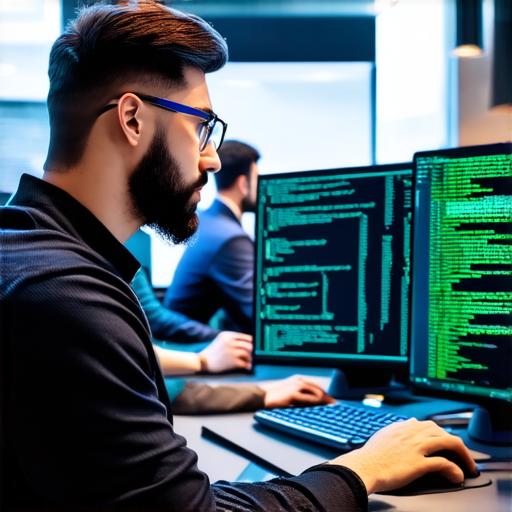
Blockchain technology is an exciting and rapidly evolving field, with countless potential applications in various industries.
As the demand for blockchain developers continues to grow, it’s essential to understand what skills and knowledge are required to excel in this role.
Introduction: What is a Blockchain Developer?
A blockchain developer is a skilled professional responsible for designing, building, and maintaining decentralized applications (dApps) on the blockchain. They work closely with clients and stakeholders to understand their needs and create innovative solutions that leverage the unique features of blockchain technology.
The Role: Key Responsibilities and Challenges
As a blockchain developer, your main responsibilities include:
- Designing and developing blockchain-based applications: This involves creating smart contracts, setting up nodes on the blockchain, and integrating blockchain APIs to build decentralized applications.
- Ensuring security and reliability: Blockchain developers must ensure that their dApps are secure from potential vulnerabilities such as hacking or data breaches. They also need to ensure that their applications are reliable, scalable, and can handle high volumes of traffic.
- Collaborating with clients and stakeholders: Blockchain developers work closely with clients and stakeholders to understand their requirements and develop solutions that meet their needs. They must be able to communicate effectively with non-technical individuals to ensure a smooth development process.
- Staying up to date with the latest technology: The blockchain ecosystem is constantly evolving, with new developments and updates being introduced regularly. Blockchain developers must keep up with these changes and adapt their skills accordingly to remain competitive in the field.
Challenges of Being a Blockchain Developer
Being a blockchain developer can be challenging for several reasons:
- Complexity: Blockchain technology is still relatively new, and many aspects of it are not yet fully understood. This complexity makes it difficult to develop applications quickly and efficiently.
- Security concerns: As mentioned earlier, blockchain developers must ensure that their dApps are secure from potential vulnerabilities. This requires a deep understanding of cryptography and security protocols, which can be challenging for some individuals.
- Limited job opportunities: While the demand for blockchain developers is growing, there are still relatively few job opportunities compared to other fields. This means that competition for jobs can be fierce, and finding a position as a blockchain developer may require significant effort and networking.
- Rapidly evolving technology: The blockchain ecosystem is constantly changing, with new developments being introduced regularly. Blockchain developers must adapt quickly to these changes and stay up to date with the latest technology to remain competitive in the field.
What Qualifications are Required to Become a Blockchain Developer?
Becoming a blockchain developer requires a combination of technical skills, knowledge, and experience. The following qualifications are essential for success:
- Strong programming skills: Blockchain developers must be proficient in at least one programming language such as Java, Python, Solidity, or JavaScript. They should also have experience with software development methodologies and version control systems like Git.
- Knowledge of cryptography: Cryptography is a critical component of blockchain technology, and all blockchain developers must have a strong understanding of cryptographic principles and algorithms.
- Experience with distributed systems: Blockchain technology relies on distributed systems, so blockchain developers should have experience working with distributed systems such as Apache Kafka or Apache Cassandra.
- Familiarity with smart contracts: Smart contracts are self-executing contracts written in a programming language that automatically enforce the terms of an agreement between parties. Blockchain developers must be familiar with smart contract development and be able to create complex smart contracts.
- Experience with blockchain platforms: While there are many blockchain platforms available, such as Ethereum, Hyperledger, and Corda, it’s essential to have experience working on at least one of these platforms.
- Good communication skills: Blockchain developers must be able to communicate effectively with clients and stakeholders to ensure that their needs are understood and met.
- Continuous learning mindset: The blockchain ecosystem is constantly evolving, and new developments are being introduced regularly. Blockchain developers must have a continuous learning mindset and be willing to adapt their skills and knowledge accordingly.
Real-World Examples of Blockchain Developers in Action
Let’s look at some real-world examples of blockchain developers in action:
- Andreas Antonopoulos: Andreas is a well-known blockchain expert and author, who has written several books on the topic. He is also a frequent speaker at conferences and events related to blockchain technology.
- Vitalik Buterin: Vitalik is the founder of Ethereum, one of the most popular blockchain platforms in use today. He is an active developer and continues to work on the Ethereum project, contributing to its development and growth.
- Ameen Mehmood: Ameen is a blockchain developer working for ConsenSys, a leading blockchain consulting firm. He has worked with several clients, helping them develop blockchain-based solutions for various industries such as finance, healthcare, and supply chain management.
- Samantha Yapochnik: Samantha is the Chief Technology Officer of Coinbase, one of the largest cryptocurrency exchanges in the world. She has been with the company since its inception and has played a crucial role in its growth and development.
Expert Insights on Becoming a Blockchain Developer
To become a successful blockchain developer, it’s essential to listen to expert insights and advice from experienced professionals in the field. Here are some tips from industry experts:
- Start with the basics: Before diving into the complexities of blockchain development, it’s essential to have a solid understanding of the basics. This includes learning about cryptography, distributed systems, and software development methodologies.
- Choose the right platform: There are many blockchain platforms available, each with its unique features and capabilities. It’s crucial to choose the right platform for your specific needs and use case.
- Build a portfolio: Building a portfolio of projects is an excellent way to showcase your skills and gain experience in blockchain development. This can include developing simple smart contracts or building more complex applications that integrate multiple blockchain technologies.
- Network with other developers: Networking with other blockchain developers can help you stay up to date with the latest developments in the field, learn from their experiences, and discover new opportunities for collaboration and growth.
- Continuously learn and adapt: The blockchain ecosystem is constantly evolving, so it’s essential to have a continuous learning mindset and be willing to adapt your skills and knowledge accordingly.
Conclusion
Becoming a blockchain developer requires a combination of technical skills, knowledge, and experience. While the demand for blockchain developers is growing, there are still limited job opportunities compared to other fields. However, with the right qualifications and a continuous learning mindset
